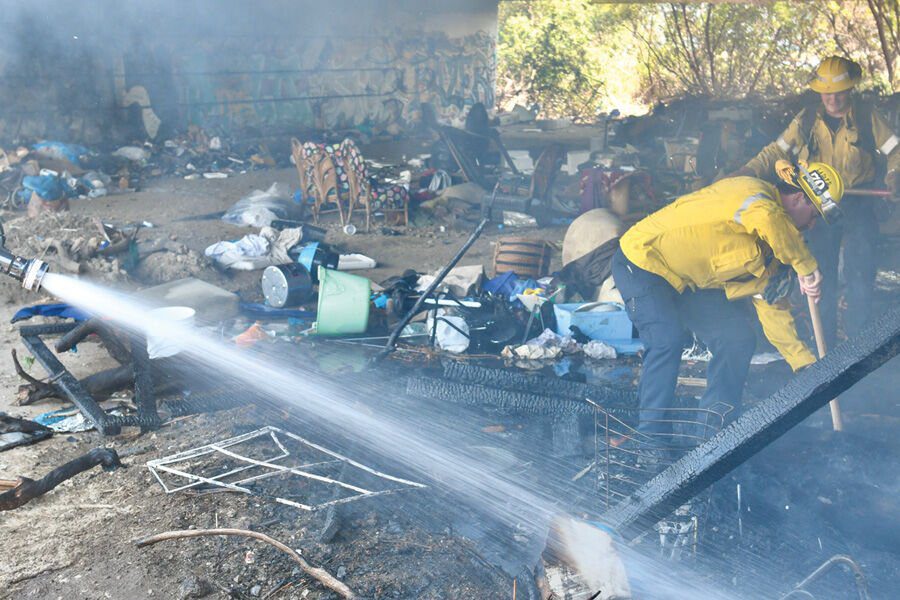There were only two agenda items on the City Council Special Meeting on Homelessness last week; both passed unanimously. The city’s so-called nuisance abatement ordinance was expanded to give private property owners more detailed definition of what constitutes a nuisance, including homeless people camping on their property with campfires and accumulating piles of human waste and trash. The amended ordinance will also allow city staff to respond more quickly to these emergency health and safety conditions on private property.
“The current definition of a [property nuisance] lacks enough detail to be clear to property owners what a nuisance is,” Susan Dueñas, public safety manager, stated in her staff report before the council vote. In addition, the city’s code did not previously call out nuisances as conditions that are a threat to adjacent properties and the general community.
The new definition of a property nuisance now includes fire and biohazards; storage of cooking, heating and camping equipment; and trash and debris.
The city has been under pressure to do something about the fire dangers to the community posed by homeless encampments for the past few years. According to the city’s own findings report, “More than 10 local fires in the past nine months originated with fires started in local homeless encampments, including encampments on private, undeveloped property.”
Although not spelled out, several of these fires originated from one particular area—privately owned vacant land near the intersection of Pacific Coast Highway and Tuna Canyon Road in eastern Malibu. The wooded area is rife with homeless encampments, with campfires responsible for starting most of the wildfires in that area. Although officials clean out the area from time to time, the homeless keep returning to it.
The city blames the property owners’ failure to secure their land against trespassers and the accumulation of “trash and human waste” for increasing the risk of wildfire and creating a health and safety hazard for the surrounding community. Up until now, city codes didn’t allow them to enter such a property and instigate “abatement procedures”—but the expanded nuisance ordinance now gives the city manager that authority. It also allows Malibu to bill the property owner for the clean-up.
The fact that the city manager can now intervene on private properties via a summary abatement procedure will significantly impact the speed at which emergency conditions can be addressed. According to the new rules, the city manager must notify the owner, occupant or tenant of the property of the hazardous conditions and ask them to voluntarily take care of it.
If the city manager is unable to contact the owner/tenant or that person fails to act immediately, then the city is authorized to begin abatement proceedings.
The amended ordinance will take effect 30 days after July 21, 2021.
At the July 12, 2021, city council meeting, the establishment of a Homelessness Task Force was approved. The task force will be comprised of 10 people, with each council member appointing two members.
Each city council member and the mayor announced their appointments: Mayor Paul Grisanti appointed Ian Roven and Terry Davis; Mayor Pro Tem Bruce Silverstein appointed Deborah Benton and Bill Sampson, Council Member Mikke Pierson appointed Bill Winokur and Wayne Cohen; Council Member Steve Uhring appointed Kelly Pessis and Scott Dittrich; and Council Member Karen Farrer appointed Paul Davis and Chris Frost.
The group includes three attorneys and two Realtors. Frost is a Malibu Public Safety Commissioner and Dittrich is a Public Works Commissioner. But most task force members are not previously known for their work with the homeless community or experience with the issues surrounding homelessness.
The task force will be charged with reviewing the draft update of the city’s homelessness strategic plan and the feasibility of providing an alternative sleeping location—a safe parking area or shelter for homeless individuals. The task force will also develop strategies to mitigate the fire safety concerns of encampments on undeveloped private property as well as other issues related to homelessness.
The Reverend Paul Elder, affiliated with St. Aidan’s Episcopal Church in Malibu, is one of Malibu’s knowledgeable and experienced people when it comes to the homeless. In his public comment, he said the creation of yet another Homeless Task Force by Malibu was just, “Kicking the can down the road by appointing a committee that may or may not come up with a solution.” He recommended building tiny houses to comply with Martin v. Boise, a Ninth District Court decision that requires cities to provide shelter if they want to prohibit homeless people from sleeping on public property.
That idea was almost immediately shot down by Farrer.
Correction: An earlier version of this story stated that Mayor Paul Grisanti nominated Ian Roven and Carrie Avis to the task force. Grisanti nominated Ian Roven and Terry Davis. The story has been updated to correct this error.

